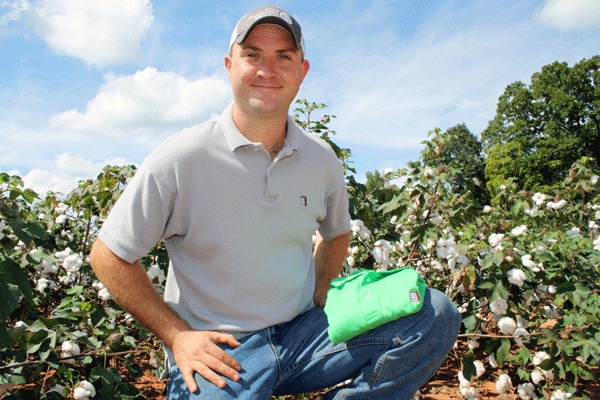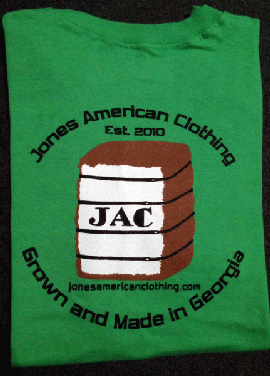
Four years ago while a student in college, Terrell Jones got serious about learning how to turn his raw cotton into a finished product he could market with his own company.Cotton quality is important to Jones, who enjoys an unusual position in the cotton-to-clothes food chain. He’s on both ends of it.

The logo on his shirt says “Jones American Clothing,” and all the cotton that went in to making it came from the soil underneath Terrell Jones’ feet as he walks through his southwest Georgia field, the same place where he hatched the idea to produce U.S.-made clothes from his own crop.
“When I was a kid, I’d see the cotton in the field and want to know where it went. Okay, it went to the gin. I could see that later. But after the gin, I wanted to know where it went and then what happened to turn it into a shirt, or clothes,” said Jones, 26. “And it may sound crazy, but I remember thinking from a very young age how cool it would be to have -- or to wear -- a shirt I knew was made from the cotton I grew.”
Four years ago while a student in college, he got serious about learning how to turn raw cotton into a finished product. It took more than a year of Internet searches, phone calls and selling himself and his passion for making apparel from his own cotton to the managers of spinning and sewing facilities, which are scarce these days in the Southeast, or in any other region in the U.S., and don’t have much incentive to serve small operations such as his.
Other than using the cotton from his farm, Jones wanted his shirts to be made in the USA, with traceability and language on the shirts to prove it. For several years, he could boast his clothing was made in Georgia, but the facility in Georgia making his finished shirts closed last year. He has another facility in South Carolina lined up to make his clothes – still USA-made, though.
So far, the business is doing better than he expected, but then again, he said, he wasn’t expecting much. “I mainly wanted to see if I could do it,” he said.
In 2011, he had 1,200 shirts made, shirts with the JAC logo made from his Stewart County cotton. He created a website for the company, and that, along with social media marketing, has allowed him to grow the business. To cover his orders in the next year, he’ll manufacture 5,000 t-shirts and polo shirts, a new item. T-shirts sell for around $17. The Polo shirts go for $42.50.
The shirts are quality-gauged at 6.2 ounces of 100-percent cotton, with a soft feel that is made to accommodate shrinkage and stay true to size after washing and drying.
He also sells “blank” shirts, or shirts with no JAC logo, to groups like family reunions or to special events that want to express a patriotic theme with American-made shirts.
“The clothing company is small, and that’s the way I’d like to keep it, though we’ll be introducing some new colors and maybe looking at other items in the future. But right now, it is paying for itself mostly by word of mouth and through our website and Facebook (and other social media),” he said.
Right now, Terrell is JAC – the owner, logistics manager, designer, marketer, farm manager, tractor driver and field hand for the company and farm. How big the clothing operation gets depends on how much “cotton I can steal from the farming side,” to make it worth while. He’ll steal about 30 bales of cotton to be spun into yarn for his clothes. After the cotton is spun into yarn, he might sit on the yarn for a while before having it finished into shirts. He doesn’t keep many shirts in stock, preferring to have the shirts made to order from the yarn for larger orders. Turnaround time on shirt delivery to the customer is about six weeks.
After father's passing, Jones manages family farm
Jones is in a pocket of good land in Stewart County, but there’s not much row crop production in the area. The rolling red-clay hills in the county are mostly suited for pine trees and hunting plantations. Providence Canyon State Park is only 10 miles away. Also known as the “Little Grand Canyon,” the state park is 1,000 acres of gullies, some more than 100 feet deep, caused by erosion from bad cotton farming practices a century ago.
Jones learned to farm from this father, Bill. When Jones was 16 or a bit younger, his dad gave him 30 acres or so “to play with,” he said. The play turned into passion, and farming is all he ever wanted to do. His father died unexpectedly in April 2013 at the age of 52. Jones runs the farm now pretty much on his own but with support from his mother, Cindy, and younger sister, Hallie.
He works about 500 acres, of which half is irrigated, planting 120 acres of cotton, 80 acres of corn and 300 acres of peanuts this year. Not too long ago, market swings dictated the crop planting on the Jones farm. But in the last few years, he has stuck to a strict crop rotation program with his acreage. And it has paid off in weed management and higher, consistent yields.
Cotton quality is important to Jones, who enjoys an unusual position in the cotton-to-clothes food chain. He’s on both ends of it.
For the last three years, he has planted Phytogen 499. He has weed resistance on his land, so he is an aggressive weed manager, using residuals, application timing and multiple modes of herbicide action as needed. During college, he was a student worker and farmhand for the USDA research facility in Tifton, Ga., working under USDA weed researcher Carroll Johnson.
“I learned a lot and saw a lot working for USDA then,” Jones said. “I not only saw what you needed to do but why. And that really stuck with me and how I farm now.”
Jones is not married and has no immediate plans for such business. His business, passion and focus now is farming and marketing his clothes. “The thing is I don’t have any hobbies. Never did really or ever played any sports,” Jones said. “All I ever wanted to do is farm and see if I could make shirts from the cotton, and say, ‘Hey, look at that. That came from my farm.’ And I’ve been fortunate enough to make that happen. I don’t like to fail. The only thing I mind failing at is golf."
About the Author(s)
You May Also Like





